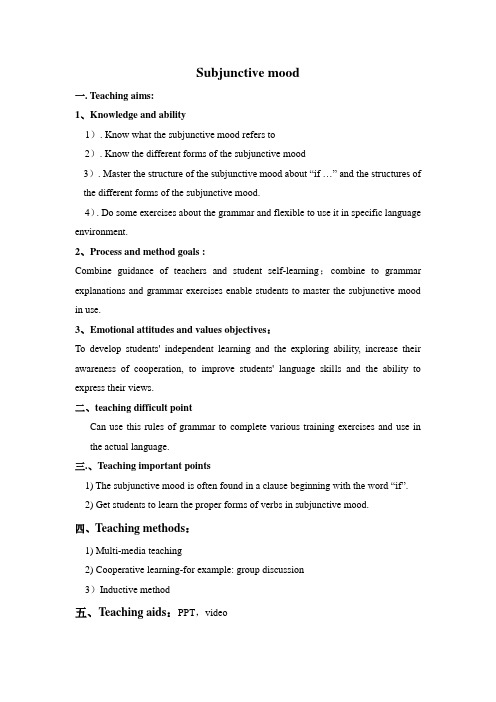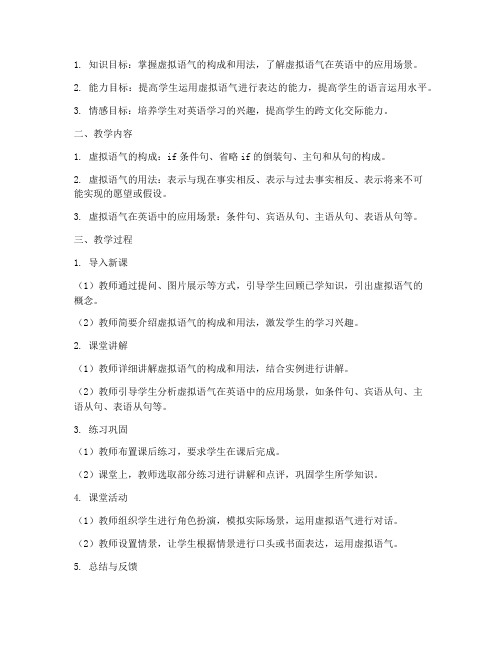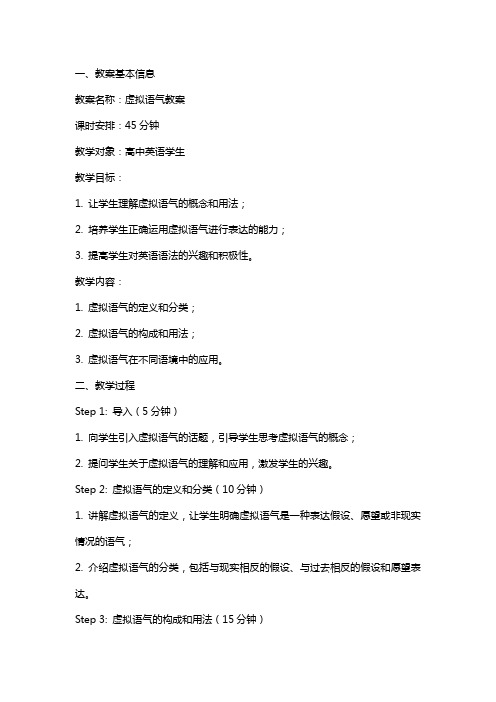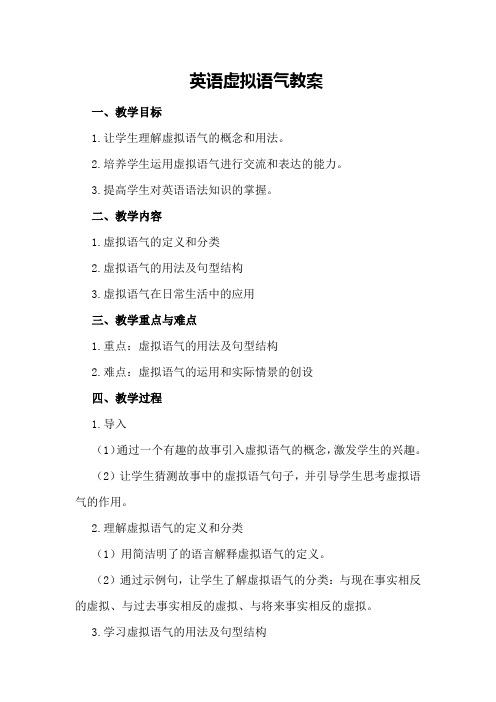虚拟语气教案2
unit2_虚拟语气教学设计

unit2_虚拟语气教学设计高中英语选修6 Unit2 Grammar Subjunctive Mood 教学设计Teaching ProceduresStep1 Lead--in1.Introduce the usage if-clause to the students and review the three situations to the students: 1)opposite to the present fact 2) opposite to the past fact 3)oppositeto the future fact2.Introduce the three examples to the students1)If I God should give me another chance, I would say three words to the girl “I love you”.2)If Jack hadn’t been on board Titanic, Jack would not have met Rose.3)If I were to live till 2154, I would be one of them and live in the Pandora.Step2 The introduction of the subjunctive mood used in if-clause1.Ask students to fill in the blanks and find out which tense should we use in different situations2.introduction of the mixed conditionals1)show the Ss two pictures and according to the picture ask them to make two sentencesa.If he hadn’t slept during the English class, he would know how to spell the new words now.b.If he hadn’t copied the other’s homework, he would not be punished by his teacher now.2)introduction of the concept of the mixed conditionalsWhen the tense in the if-clause and the main clause are not the same, we use the mixed conditionale.g. If you had come and attended the meeting yesterday, you would know what we are doing now.If you had followed my advice, you would not be in troublenow.3) introduction of the inversion in the if-clauseWe can omit If and place should, were, had in the beginning of the sentence.e.g. Were I Obama, I would company my daughter every day.4. exercise If you were the manager here, what would you do?Were you the manager here, what would you do?Step 3 introduction of the subjunctive mood used in the object clause1.the object clause after wish1)show the Ss some examples of the wish clause and ask them to conclude the rule of it.the example sentencesa.I wish I were a bird.b.I wish I had finished this homework.c.I wish it would rain tomorrow.d.I wish I hadn’t made such a mistake.2)the rules of the wish clausewish----- 与过去事实相反:过去完成时与现在事实相反:过去式与将来事实相反:would/could/might+ do3)exercisea.I wish I were (be) ten years younger now.b.I wish I had said (say) such tough words to you.c.I wish it would rain(rain)tomorrow.2.The clause after “would rather”1)show the Ss some examples of the wish clause and ask them to conclude the rule of it.a.I would rather you paid me now.b.I would rather you told me the truth at present.c.I would rather you had been present.d.I would rather you had gone there yesterday.e.Don’t come.I would rather you came tomorrow.2)the rules of the clause would ratherwould rather: 与现在事实相反--- 一般过去时与过去事实相反--- 过去完成时与将来事实相反--- 一般过去时3)exercise: ask Ss to fill in the blanksa.It’s getting late. I’d rather you left (leave) now.b.John wants to see me today. I would rather he came (come) here tomorrow than today.c.I’d ra ther she sat (sit) next to me.d.I’d rather you hadn’t said (say)it.3.The object clause in the sentence expressing suggestion1)Ask Ss to observe the sentences and find out which sentences using the subjunctive mood.Suggested answers:a.My family insisted that I should not give in, but stay and fight.b.Please advise me which book I should read first.c.He ordered that the work should be started at once.2)宾语从句中出现动词: 一个坚持, 两个命令, 三个建议, 四个要求。
虚拟语气教案 (2)

Subjunctive mood一. Teaching aims:1、Knowledge and ability1). Know what the subjunctive mood refers to2). Know the different forms of the subjunctive mood3). Master the structure of the subjunctive mood about “if …” and the structures of the different forms of the subjunctive mood.4). Do some exercises about the grammar and flexible to use it in specific language environment.2、Process and method goals :Combine guidance of teachers and student self-learning;combine to grammar explanations and grammar exercises enable students to master the subjunctive mood in use.3、Emotional attitudes and values objectives:To develop students' independent learning and the exploring ability, increase their awareness of cooperation, to improve students' language skills and the ability to express their views.二、teaching difficult pointCan use this rules of grammar to complete various training exercises and use in the actual language.三.、Teaching important points1) The subjunctive mood is often found in a clause be ginning with the word “if”.2) Get students to learn the proper forms of verbs in subjunctive mood.四、Teaching methods:1) Multi-media teaching2) Cooperative learning-for example: group discussion3)Inductive method五、Teaching aids:PPT,video五、Teaching procedures:Step 1 Lead in and greeting1.GreetingT: Good morning! Everyone, how are you today?Ss:T: What day is it today?Ss:2.lead in----------Watch a video-----周星驰的《大话西游》经T: Would you like to watch a video?Ss:T: When you watch the video, pay attention to the movie lines, and then try to translate it into English.T: Could you give a voice to the character in the movie in English?S:T: Ok, look at the classic dialogue of the film, and read together.If God can give me another chance, I will say 3 words to her --- I love you.If you have to give a time limit to this love, I hope it is 10 thousand years.T: Very good! I will show you some picture, and I want you to describe the meaning of pictures according to these two sentences.(I , study, the school of America)T: Who wants to try?S: If I have money, I will go to study in America.T: Great! Who wants try again?S:T: Just now our classmates give us so many sentences; can find out the common point of these sentences?Ss: All these sentences are beginning with "if”.T: Yes. Very good! These sentences are "if" conditional sentences.Step2 presenting1、Suppose three ConditionsBy setting the above three situations, show a different time condition virtual sentence, let the students find the rules of grammar, and summed up the different time a non real conditionals.1). First conditionalIf I have enough money, I will go to study in America.2). Second conditionalIf I had enough money, I would go to study in America.3). Third conditionalIf I had had enough money, I would have gone to study in America.2、Explain in detail the meaning and usage of the subjunctive mood。
虚拟语气教学设计方案

1. 知识目标:掌握虚拟语气的构成和用法,了解虚拟语气在英语中的应用场景。
2. 能力目标:提高学生运用虚拟语气进行表达的能力,提高学生的语言运用水平。
3. 情感目标:培养学生对英语学习的兴趣,提高学生的跨文化交际能力。
二、教学内容1. 虚拟语气的构成:if条件句、省略if的倒装句、主句和从句的构成。
2. 虚拟语气的用法:表示与现在事实相反、表示与过去事实相反、表示将来不可能实现的愿望或假设。
3. 虚拟语气在英语中的应用场景:条件句、宾语从句、主语从句、表语从句等。
三、教学过程1. 导入新课(1)教师通过提问、图片展示等方式,引导学生回顾已学知识,引出虚拟语气的概念。
(2)教师简要介绍虚拟语气的构成和用法,激发学生的学习兴趣。
2. 课堂讲解(1)教师详细讲解虚拟语气的构成和用法,结合实例进行讲解。
(2)教师引导学生分析虚拟语气在英语中的应用场景,如条件句、宾语从句、主语从句、表语从句等。
3. 练习巩固(1)教师布置课后练习,要求学生在课后完成。
(2)课堂上,教师选取部分练习进行讲解和点评,巩固学生所学知识。
4. 课堂活动(1)教师组织学生进行角色扮演,模拟实际场景,运用虚拟语气进行对话。
(2)教师设置情景,让学生根据情景进行口头或书面表达,运用虚拟语气。
5. 总结与反馈(1)教师对本节课所学内容进行总结,强调重点和难点。
(2)教师鼓励学生提出疑问,解答学生在学习过程中遇到的问题。
四、教学评价1. 课堂表现:观察学生在课堂上的参与度、提问、回答问题等方面。
2. 课后练习:检查学生的课后练习完成情况,了解学生对虚拟语气的掌握程度。
3. 课堂活动:观察学生在课堂活动中的表现,了解学生运用虚拟语气进行表达的能力。
五、教学反思1. 教师根据学生的学习情况,调整教学策略,提高教学质量。
2. 教师关注学生的个体差异,因材施教,提高学生的学习兴趣。
3. 教师鼓励学生积极参与课堂活动,提高学生的语言运用能力。
大学英语虚拟语气教案

教学目标:1. 理解虚拟语气的概念和本质。
2. 掌握虚拟语气在英语中的不同用法和结构。
3. 能够正确运用虚拟语气表达假设、推测和愿望等非真实情况。
4. 提高学生英语写作和口语表达的能力。
教学重点:1. 虚拟语气的概念和分类。
2. 虚拟语气在不同从句中的用法。
3. 虚拟语气在特定语境中的运用。
教学难点:1. 虚拟语气时态的区分和运用。
2. 虚拟语气在复杂句子中的识别和运用。
教学工具:1. 多媒体课件2. 练习题3. 英语词典教学过程:一、导入1. 通过提问的方式引导学生回顾英语时态的相关知识,如过去时、现在时、将来时等。
2. 引入虚拟语气的概念,解释虚拟语气是表示假设、推测、愿望等非真实情况的语气。
二、讲解虚拟语气1. 虚拟语气的概念:虚拟语气是一种表示假设、推测、愿望等非真实情况的语气,通常用非真实时态来表达。
2. 虚拟语气的分类:- 条件虚拟语气:用于表示与现在或过去事实相反的假设情况。
- 让步虚拟语气:用于表示尽管存在某种情况,但仍然希望实现某种愿望。
- 目的虚拟语气:用于表示为了实现某种目的而采取的措施。
- 结果虚拟语气:用于表示某种假设情况的结果。
三、虚拟语气在从句中的用法1. 条件从句:- 与现在事实相反:If I were you, I would study hard.- 与过去事实相反:If I had studied harder, I would have passed the exam.- 与将来事实相反:If it rained tomorrow, I would stay at home.2. 让步从句:- Even if you are tired, you should continue working.- Though he is poor, he is happy.3. 目的从句:- In order to pass the exam, I have to study hard.- I will do my best to improve my English.4. 结果从句:- If you study hard, you will pass the exam.- He tried his best, but still failed.四、练习1. 完成练习题,巩固对虚拟语气用法的理解。
大学虚拟语气教案

课程目标:1. 让学生了解虚拟语气的概念和用法。
2. 帮助学生掌握虚拟语气在句子中的不同用法,包括与现在事实相反、与过去事实相反和与将来事实相反。
3. 提高学生运用虚拟语气进行英语表达的能力。
教学对象:大学英语学习者教学时间:2课时教学准备:1. 教学PPT或黑板2. 课本或相关教学材料3. 练习题和答案教学过程:第一课时一、导入1. 通过日常生活中的例子引入虚拟语气的概念,如假设情景的描述。
2. 提问学生:“你们在生活中有没有遇到过需要用虚拟语气的情况?”二、讲解虚拟语气的概念和用法1. 解释虚拟语气的定义:虚拟语气是表示与事实相反或不可能实现的假设、愿望、建议等。
2. 讲解虚拟语气的基本结构:- 与现在事实相反:if + 主语 + were, 主语 + would/could/might/should + 动词原形- 与过去事实相反:if + 主语 + had + 过去分词,主语 +would/could/might/should + have + 过去分词- 与将来事实相反:if + 主语 + were to/should + 动词原形,主语 + would/could/might/should + 动词原形三、示例讲解1. 展示几个虚拟语气的句子,并解释其含义。
2. 让学生尝试翻译句子,加深对虚拟语气用法的理解。
四、练习1. 让学生完成一些关于虚拟语气的练习题,巩固所学知识。
2. 教师解答学生疑问,纠正错误。
第二课时一、复习1. 复习上一节课所学的虚拟语气概念和用法。
2. 通过提问或小组讨论的方式,让学生回顾所学内容。
二、深入讲解虚拟语气在特定语境中的运用1. 讲解虚拟语气在条件状语从句、让步状语从句、结果状语从句和目的状语从句中的运用。
2. 通过具体例句,让学生理解虚拟语气在不同从句中的用法。
三、练习1. 让学生完成更多关于虚拟语气的练习题,包括不同语境下的虚拟语气运用。
2. 教师解答学生疑问,纠正错误。
虚拟语气教案范文

一、教案基本信息教案名称:虚拟语气教案课时安排:45分钟教学对象:高中英语学生教学目标:1. 让学生理解虚拟语气的概念和用法;2. 培养学生正确运用虚拟语气进行表达的能力;3. 提高学生对英语语法的兴趣和积极性。
教学内容:1. 虚拟语气的定义和分类;2. 虚拟语气的构成和用法;3. 虚拟语气在不同语境中的应用。
二、教学过程Step 1: 导入(5分钟)1. 向学生引入虚拟语气的话题,引导学生思考虚拟语气的概念;2. 提问学生关于虚拟语气的理解和应用,激发学生的兴趣。
Step 2: 虚拟语气的定义和分类(10分钟)1. 讲解虚拟语气的定义,让学生明确虚拟语气是一种表达假设、愿望或非现实情况的语气;2. 介绍虚拟语气的分类,包括与现实相反的假设、与过去相反的假设和愿望表达。
Step 3: 虚拟语气的构成和用法(15分钟)1. 讲解虚拟语气的构成,包括动词的过去式或过去分词形式,以及有时态的变化;2. 举例说明虚拟语气的用法,让学生理解在不同语境中如何正确使用虚拟语气。
Step 4: 虚拟语气在句子中的位置(10分钟)1. 讲解虚拟语气在句子中的位置,包括主句和从句中的使用;2. 让学生通过练习句子,掌握虚拟语气的正确位置。
Step 5: 虚拟语气在实际应用中的练习(5分钟)1. 提供一些句子,让学生运用虚拟语气进行改写;2. 让学生分组讨论,分享彼此的答案,并进行互相纠正和指导。
Step 6: 总结与作业布置(5分钟)1. 对本节课的内容进行总结,强调虚拟语气的概念和用法;2. 布置作业,要求学生运用虚拟语气进行句子改写和短文写作。
三、教学评估通过学生在练习中的表现和作业的完成情况,评估学生对虚拟语气的理解和应用能力。
鼓励学生在课堂上积极提问和参与讨论,提高学生的学习积极性。
四、教学资源1. 虚拟语气PPT;2. 虚拟语气的相关练习材料;3. 虚拟语气的参考资料。
五、教学反思在课后对自己的教学进行反思,总结教学中的优点和不足之处,并根据学生的反馈进行改进。
英语虚拟语气教案

英语虚拟语气教案一、教学目标1.让学生理解虚拟语气的概念和用法。
2.培养学生运用虚拟语气进行交流和表达的能力。
3.提高学生对英语语法知识的掌握。
二、教学内容1.虚拟语气的定义和分类2.虚拟语气的用法及句型结构3.虚拟语气在日常生活中的应用三、教学重点与难点1.重点:虚拟语气的用法及句型结构2.难点:虚拟语气的运用和实际情景的创设四、教学过程1.导入(1)通过一个有趣的故事引入虚拟语气的概念,激发学生的兴趣。
(2)让学生猜测故事中的虚拟语气句子,并引导学生思考虚拟语气的作用。
2.理解虚拟语气的定义和分类(1)用简洁明了的语言解释虚拟语气的定义。
(2)通过示例句,让学生了解虚拟语气的分类:与现在事实相反的虚拟、与过去事实相反的虚拟、与将来事实相反的虚拟。
3.学习虚拟语气的用法及句型结构(1)分别讲解三种虚拟语气的用法和句型结构。
(2)通过练习,让学生掌握虚拟语气的用法。
4.实践虚拟语气的应用(1)设计一些实际情景,让学生运用虚拟语气进行表达。
(2)让学生分组进行角色扮演,运用虚拟语气进行交流。
(2)通过练习,巩固学生对虚拟语气的掌握。
6.作业布置(1)让学生翻译一些含有虚拟语气的句子。
(2)让学生编写一段含有虚拟语气的对话或短文。
五、教学反思1.本节课通过生动的故事导入,激发了学生的学习兴趣。
2.在讲解虚拟语气的用法和句型结构时,注重理论与实践相结合,让学生在实际情景中运用虚拟语气。
3.通过分组练习和角色扮演,提高了学生的互动性和积极性。
4.作业布置有助于巩固学生对虚拟语气的掌握。
5.教学过程中,注意关注学生的反馈,及时调整教学方法和节奏。
六、教学评价1.课后对学生的学习效果进行评价,了解学生对虚拟语气的掌握程度。
2.通过作业和课堂表现,评价学生的参与度和积极性。
3.收集学生的意见和建议,不断改进教学方法,提高教学质量。
七、教学延伸1.进一步讲解虚拟语气的高级用法,如倒装句、强调句等。
2.结合实际生活,让学生学会在不同场景中运用虚拟语气。
高中虚拟语气教案

高中虚拟语气教案一、教学目标1. 让学生理解虚拟语气的概念和用法。
2. 培养学生正确运用虚拟语气进行表达的能力。
3. 提高学生对英语语法的兴趣和积极性。
二、教学内容1. 虚拟语气的定义和分类2. 虚拟语气的构成和用法3. 虚拟语气在不同语境中的应用三、教学重点与难点1. 虚拟语气的定义和分类2. 虚拟语气的构成和用法3. 虚拟语气在条件句和愿望句中的应用四、教学方法1. 讲授法:讲解虚拟语气的定义、分类和构成。
2. 案例分析法:分析典型例句,展示虚拟语气的用法。
3. 练习法:设计练习题,让学生巩固所学内容。
4. 小组讨论法:分组讨论虚拟语气在实际语境中的应用。
五、教学过程1. 导入:引导学生思考虚拟语气的概念,激发学习兴趣。
2. 讲解:详细讲解虚拟语气的定义、分类和构成。
3. 示例:展示典型例句,分析虚拟语气的用法。
4. 练习:设计练习题,让学生进行虚拟语气的实际操作。
5. 讨论:分组讨论虚拟语气在条件句和愿望句中的应用。
6. 总结:回顾本节课所学内容,强调虚拟语气的关键点。
7. 作业:布置作业,巩固虚拟语气的运用。
六、教学评估1. 课堂问答:检查学生对虚拟语气概念的理解和运用。
2. 练习题:评估学生对虚拟语气构成和用法的掌握。
3. 小组讨论:观察学生在讨论中的表现,了解他们对虚拟语气的实际应用能力。
七、教学拓展1. 虚拟语气的其他用法:介绍虚拟语气在其他语境中的应用,如虚拟条件句、虚拟倒装句等。
2. 文化背景:讲解虚拟语气在英语文化中的特殊用法和表达习惯。
3. 实践任务:让学生运用虚拟语气编写一段对话或短文,展示其实际应用能力。
八、教学反思1. 总结本节课的教学效果,反思教学方法的适用性。
2. 分析学生的学习情况,针对性地调整教学策略。
3. 搜集学生反馈,了解他们对虚拟语气的掌握程度,为后续教学提供参考。
九、课后作业1. 复习虚拟语气的定义、分类和构成。
2. 完成课后练习题,巩固虚拟语气的运用。
- 1、下载文档前请自行甄别文档内容的完整性,平台不提供额外的编辑、内容补充、找答案等附加服务。
- 2、"仅部分预览"的文档,不可在线预览部分如存在完整性等问题,可反馈申请退款(可完整预览的文档不适用该条件!)。
- 3、如文档侵犯您的权益,请联系客服反馈,我们会尽快为您处理(人工客服工作时间:9:00-18:30)。
Unreal conditionalsUnreal conditionals and things hoped for or desiredThere are other ways to talk about unreal situations apart from those we have learnt.1. We use mixed conditionals when the time of the main clause is different from that of the if clause.1)If I were you,I wouldn't have missed the film last night.如果我是你,我就不会错过昨天晚上的那部电影。
(从句与现在事实相反,主句与过去事实相反。
)2)If he had followed the doctor's advice,he would recover already.如果他遵照医生的劝告,现在病就好了。
(从句与过去事实相反,主句与现在事实相反。
)3) If the boy hadn't been saved this afternoon, his family would not be in peace now.如果那个男孩今天下午没有被救,他的家现在就不会如此安宁。
4) If the machine were in good conditions, we would have used it in our last experiment.要是这台机器情况良好,我们上次就将它用于试验了。
5) If you were to visit Hainan in two days, I could arrange for some of my friends there to meet you at the airport.假如你过两天去海南,我现在就可以安排我在那儿的朋友去机场接你。
2. We can use otherwise, or and phrases beginning with with, without and but for in place of if clauses in implied conditionals.1) We couldn't have succeeded without your help (=if we hadn't got your help).2) But for the rain(=If it hadn't been for the rain),we would have finished the work.3) Without air, there would be no life on the earth.要是没有空气,地球上就不会有生命了。
4) But for your help, the little boy would have been drowned.要是没有你们的帮助,那个小男孩早就淹死了。
5) We could have done the work better in that case.要是那样的话,我们本可以把工作干得更好一些的。
(2) 用一个副词或连词but / otherwise / or等表示虚拟条件和真实情况交织在一句中如:1) He telephoned to inform me of your birthday,or (=If he hadn't telephoned to inform me ofyour birthday)I would have known nothing about it.2) There might have been a terrible accident, but he braked the car before it was too late.= if he hadn’t braked the car before it was too late.3) He would have come to see you earlier but he just came back from his business trip .(本句中的上下文是:but he just came back from his business trip,表示:要是他在家没出差的话)他本来早就来看你了,可他却出差刚刚回来。
4) But that you helped me, I would have failed in the experiment.(本句中的上下文是:But that you helped me,表示:要不是有你帮助我)要没有你帮助我,我的试验本做不成功的3.We also use even if, as if, as though and if only to introduce unreal situation.He treats the little girl as if she were his own daughter.If only I had seen the film.I would never go there en if I were given the chance to.Nicholas is smiling as if he knew nothing about it.Mike talks as though he had been to the Great Wall before.4. We can express unreal situations after wish and would rather.I wish there were no wars in the world.I would rather you hadn’t told me about.5. We normally use should+ bare infinitive in clauses which express a suggestion, requirement or demand. The word should can be omitted.1. 用在宾语从句中:be/ should doHe insisted that Kate (should) do the job.We suggested that the meeting (should) not be postponed.Verbs:ask、advise、determine、decide、command、insist、propose、move、prefer、urge、order、recommend、request、require、demand、suggest、desire、intendExe: She asked that she ___ allowed to see her son in police custody.A. would beB. could beC. beD. was2. 用在主语从句中It is necessary that you (should) be present at the discussion.It is essential that you (should) win the voters’ hearts.Adj.:essential、necessary、important、advisable、appropriate、desirable、fitting、imperative (紧急的)、impossible、necessary、proper、urgent、insistent、strangeed- participle:desired、demanded、ordered、requested、suggested、recommended、required,etc.Exe: It is imperative that students hand in their terms papers on time.3. 用在同位语从句或表语从句中1) The suggestion that he be invited was rejected.2) Their demand is that their wages be increased by 20%.Nouns:advice、command、demand、desire、order、decision、decree(法令、判决)instruction、requirement、resolution(决定)、suggestion、recommendation、necessity、request、proposal,etc.3) He left orders that nothing be touched until the police arrived here.这一用法中,be-型虚拟式可与“should+不定式”交替使用,也可与“to-不定式”交替使用。
4) He ordered that the books be sent at once.=He ordered that the books should be sent at once.=He ordered that the books to be sent at once.6.it’s (high/about) ti me 后的从句用虚拟语气It’s time that we had/ should have a meeting to talk about the problem.同步练习1. Maybe if I ________ science, and not literature then, I would be able to give you more help.A.studiedB. would studyC. had studiedD. was studying2. I ________ through that bitter period without your generous help.A. couldn’t have goneB. didn’t goC. wouldn’t goD. hadn’t gone3. I ________ sooner but I didn’t know that they were waiting for me.A. had comeB. was comingC. would comeD. would have come4. George is going to talk about the geography of his country, but I’d rather he ________ more on its culture.A. focusB. focusedC. would focusD. had focused5. Teachers recommend parents ________ their children under 12 to ride bicycles to school for safety.A. not allowB. do not allowC. mustn’t allowD. couldn’t allowCA DB A用所给词的适当形式填空1.We followed his suggestion that we ________ (ask) our teacher for help.2.If only I ________(finish) my homework yesterday.3.She came to town yesterday, otherwise/or I ________(not meet) her.4.But for your help in time, we ________(not arrive) home safe and sound.5.The man insisted that he ________(not steal) anything and insisted that he ________(set) freeright away.6. A few hours earlier, and you ________(see) the famous writer.Ask; had finished; would not have met; would not have arrived,;didn’t steal,should be set; would have seen选择填空1.---Did you attend the meeting?---I ________ the news now if I ________ it.A. would have known; had attendedB. would know; attendC. would knowD. would have known; attended2.It’s time that he ________ what he should choose as his major.A. would reconsiderB. reconsidersC. has reconsideredD. reconsidered3.How I wish I ________ to learn Japanese when I was ten.A. would beginB. beganC. should beginD. had begun4. A few minutes earlier and we ________ the train.A. have caughtB. had caughtC. could have caughtD. were to catch5.He talks about pyramids as if he ________ them himself.A. sawB. has seen D. had seen D. did see6.The officer ordered that the soldiers ________ themselves at once.A. must hideB. didC. hideD. had hidden7.He hesitated for a moment before kicking the ball, otherwise he ________ a goal.A. had scoredB. scoredC. would scoreD. would have scored8.He _______ the job well, but he ________ so careless.A. had done; had beenB. could do; wasC. could have done; wasD. hadn’t done ; had been9.Without electricity human life ________ quite different today.A. isB. will beC. would have beenD. would be10.If only I ________ the news yesterday! I had wanted to call on her.A.had knownB. have knownC. knewD. knowCDDCC CDCDA。
